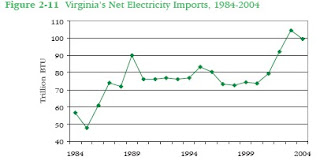 In a recent post, “Virginia’s Growing Energy Gap,” I argued it doesn’t matter where Virginia gets its energy from, as long as it’s from a secure region of the world like North America. (The recent bombing of a Mexican pipeline by a group linked to Venezuela’s socialist despot Hugo Chavez may force me to rethink which parts of the world qualify as secure.) But I do find it strange — and somewhat troubling — that Virginia imports one third of its electricity from other states.
In a recent post, “Virginia’s Growing Energy Gap,” I argued it doesn’t matter where Virginia gets its energy from, as long as it’s from a secure region of the world like North America. (The recent bombing of a Mexican pipeline by a group linked to Venezuela’s socialist despot Hugo Chavez may force me to rethink which parts of the world qualify as secure.) But I do find it strange — and somewhat troubling — that Virginia imports one third of its electricity from other states.
According to the Virginia Energy Plan, Virginia’s electricity imports have climbed significantly since 2000. Some imports come from Dominion’s Mount Storm power generating complex and some from out-of-state generating sources in the AEP and Allegheny power systems. But most of the increase, I believe, appears to coincide with Dominion’s strategy of buying electricity from the Midwest and wheeling it into Virginia through the PJM transmission pool — a practice that gained momentum during the power company’s flirtation with deregulation.
Dominion is a proponent of what I call the Big Grid energy strategy, of building a dense network of electric transmission lines in order to shift electricity long distances to those regions where it is most needed. But the approach has major drawbacks. First, as demonstrated by massive blackouts in the Midwest and Northeast earlier in the decade, the system is subject to catastrophic failure. Second, it requires building high-voltage transmission lines — such as the line that Dominion proposes for Virginia’s northern piedmont — which people don’t like running through their back yard.
I wouldn’t have a problem with the transmission lines if Dominion negotiated the rights of way with the individual property owners whose land it crossed. But Dominion doesn’t want to do that — it wants to utilize the power of eminent domain to compel landowners to sell their right of way. What’s more, as I understand it, landowners would be compensated only for the land in the right of way itself. They would receive no compensation for the loss of property value caused by visual blight on land surrounding the transmission line. That may seem like an arcane point to some, but consider: How would you feel if you paid $5 million for a farm, valued largely on the beauty of the surroundings, and Dominion ran a transmission line through it? Dominion might pay you $100,000 for the right of way, but the value of your farm might decline $1 million or $2 million in value.
The alternative to Big Grid is a distributed grid that integrates a legion of small and independent power contributors into the mix: wind mills, solar, biomass conversion, cogeneration and so on. By keeping the power source closer to the consumer, distributed generation does not experience the electricity leakage that occurs with long-distance transmission, nor it is as vulnerable to a catastrophic, system-wide failure.
If electric utilities are willing to pay the full cost of building electric transmission lines, then, I say, “Let ‘er rip!” However, I have no sympathy with those who would say, “But that would be too expensive.” Expensive to whom? To Dominion and its Northern Virginia customers? How about the people who own piedmont real estate?
If Northern Virginians want more electricity to build more energy-hogging server farms that yield big tax revenues for municipalities, why don’t they build power plants locally? Could the reason be that nobody in Northern Virginia likes power plants? Could it be that Northern Virginians prefer, for aesthetic reasons, to import their electric power?
Here’s the stand off: Northern Virginians don’t want power plants in their midst, and piedmont inhabitants don’t want transmission lines running through their land. Here’s the trick: The onus is on the Northern Virginians to find a solution because they’re the ones who want the electric power. They can build big Dominion-style power plants in their own back yards, or they can evolve to a system of distributed energy, or they can pay the piedmontese the full cost of running a transmission line through their region. They have no right, through the agency of Dominion, to simply take what they want.


